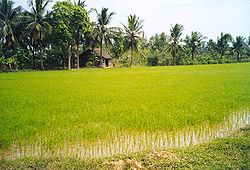Bến Tre Province
|
Bến Tre Province Tỉnh Bến Tre |
|
|---|---|
| Province | |

Bến Tre countryside around Cái Mon
|
|
| Nickname(s): Bamboo Landing | |
 Location of Bến Tre within Vietnam |
|
| Coordinates: 10°10′N 106°30′E / 10.167°N 106.500°ECoordinates: 10°10′N 106°30′E / 10.167°N 106.500°E | |
| Country |
|
| Region | Mekong Delta |
| Capital | Bến Tre |
| Government | |
| • People's Council Chair | Nguyễn Hữu Phước |
| • People's Committee Chair | Nguyen Thi Thanh Ha |
| Area | |
| • Total | 2,321.6 km2 (896.4 sq mi) |
| Population (2004) | |
| • Total | 1,345,600 |
| • Density | 580/km2 (1,500/sq mi) |
| Demographics | |
| • Ethnicities | Vietnamese, Khmer, Hòa, Tày |
| Time zone | ICT (UTC+7) |
| Calling code | 75 |
| ISO 3166 code | VN-50 |
| Website | www |
Bến Tre (![]() listen) is a province of Vietnam. It is one of the country's southern provinces, being situated in the Mekong Delta.
listen) is a province of Vietnam. It is one of the country's southern provinces, being situated in the Mekong Delta.
Bến Tre is subdivided into 9 district-level sub-divisions:
They are further subdivided into 7 commune-level towns (or townlets), 147 communes, and 10 wards. See also List of communes in Bến Tre Province.
Geographically, Bến Tre is wedged between the two main branches of the Tiền Giang River, which is itself one of the two main branches of the Mekong. The province's northern boundary is formed by the Tiền Giang's main course, while the province's southern boundary is formed by the Tiền Giang's largest branch (which breaks away from the Tiền Giang just upriver from Bến Tre province). Between the Tiền Giang and its main branch are two smaller branches, passing through the middle of Bến Tre.
The entire province is criss-crossed with a network of smaller rivers and canals. The extensive irrigation that this provides makes Bến Tre a major producer of rice, but also means that the area is prone to flooding. The Climate Change Research Institute at Cần Thơ University, in studying the possible consequences of climate change, has predicted that 51% of Bến Tre province can be expected to be flooded if sea levels rise by 1 meter. Bến Tre Province is, on average, only 1.25 metres above sea level.
Construction on the Rạch Miễu Bridge, which links Bến Tre to its northern neighbour, Tiền Giang Province, was started in 2002. The bridge was finished and opened for traffic on 19 January 2009. Before that time, Bến Tre was only accessible to automobiles via ferry.
In what has been called "the start of the Vietnam War", in January and February 1960 the Viet Cong attacked and took temporary control of several districts in Kiến Hòa Province province (now Bến Tre Province). The Viet Cong set up "people's committees," and confiscated land from landlords and redistributed it to poor farmers. One of the leaders of the uprising was Madame Nguyễn Thị Định who led the all-female "Long Hair Army." Dinh was the secretary of the Ben Tre Communist Party and later a Viet Cong Major General.
...
Wikipedia
